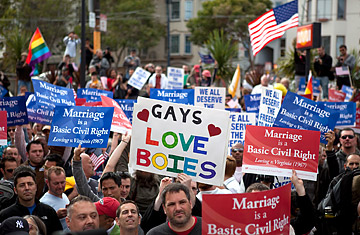
A Prop 8 opponent holds a sign referencing attorney David Boies during a rally to celebrate the ruling to overturn the proposition in San Francisco on Aug. 4, 2010
(2 of 2)
Cooper, a former lawyer for the Reagan-era Justice Department, will argue that given the state's natural interest in procreation and child rearing, it's entirely reasonable that it be allowed to limit marriage to a man and a woman. "Before the recent movement to redefine marriage to include same-sex relationships, it was commonly understood and acknowledged that the institution of marriage owed its very existence to society's vital interest in responsible procreation and child rearing," he wrote in a brief filed in advance of the appeal. "Indeed, no other purpose can plausibly explain the ubiquity of the institution."
Senior Circuit Judge Michael Hawkins of Phoenix, the third judge hearing the Dec. 6 arguments, is considered a moderate by many, including himself. Nominated by President Clinton in 1994 while serving as U.S. Attorney in Arizona, Hawkins said in a 2003 interview with the How Appealing legal blog, "I think of myself as being entirely moderate in all things, but others might say otherwise." He acknowledged, however, that judges often do reflect the philosophies of the President who nominated them: "It cannot be ignored that judges are often (but not always) something of a mirror of the President who appointed them." In two of his most watched opinions, he indicated a possible liberal, but not brazenly ideological, slant. One is from United States v. Leonti, a 2003 case in which the majority held that the Sixth Amendment's guarantee of effective assistance of counsel extends beyond the trial to include any discussions about a possible plea bargain. And in September he issued a sharply worded dissent in Mohamed v. Jeppesen Dataplan, in which an 11-judge panel of the Ninth Circuit voted 6-5 to dismiss a lawsuit brought by prisoners who allege they were tortured in foreign prisons as part of the CIA's program of extraordinary rendition. The government asked that the suit be dismissed to protect the secrecy of the program, and the majority agreed, citing the power of the so-called state secrets doctrine. Hawkins, writing for all five dissenters, objected, saying, "The doctrine is so dangerous as a means of hiding governmental misbehavior under the guise of national security, and so violative of common rights to due process, that courts should confine its application to the narrowest circumstances that still protect the government's essential secrets." The ACLU has vowed to appeal.
But the first order of business on Dec. 6 won't be arguments over the constitutional merits of gay marriage. Instead, the three judges have set aside a full hour to first hear whether the case can be appealed at all. When Olson and Boies brought their case against Prop 8 last year, neither California Governor Arnold Schwarzenegger nor Attorney General Jerry Brown opted to defend it. Instead, the group behind Prop 8 itself was granted permission to defend it in court. But now that a judge has ruled against the proposition, it's not clear whether that same group has standing to appeal. Normally, the parties that can challenge a decision overturning state law are those that represent the state itself, not a private group — no matter how closely involved in the initial campaign for the law it may have been.
In agreeing to stay his ruling until the Ninth Circuit can rule, Walker expressed strong doubts that the Prop 8 backers will be allowed to proceed, but he passed that issue to the Ninth Circuit. Now the appeals judges have instructed lawyers to show why the appeal can continue, and will spend half their allotted two hours on Dec. 6 on that issue alone. If the Prop 8 backers can't convince them that they have standing to appeal Walker's decision, the ruling striking down Prop 8 will stand — and marriages between gay couples will resume.
Of course, even a decision on the standing question can be appealed to the Supreme Court, which in the end will have the discretion to hear the case itself or let stand whatever ruling the Ninth Circuit renders. That's something that appellate court judges rarely forget. "It should not be surprising that we see some things differently," Hawkins said in an interview. "But as members of an institution described in the Constitution as 'such inferior courts,' we are ever mindful that the Supreme Court has the last word."
